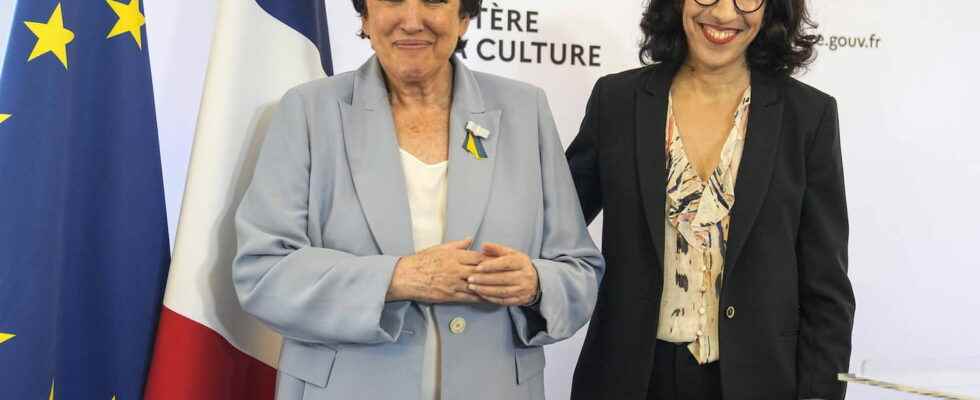CULTURAL MINISTER. A time approached in 2020, Rima Abdul-Malak had finally not had the post, the media Roselyne Bachelot having then been preferred to her. Portrait of the new Minister of Culture.
[Mis à jour le 20 mai 2022 à 23h12] Rima Abdul-Malak. This is the name of the new Minister of Culture. Born in Beirut, this 44-year-old Franco-Lebanese is (finally) making her way to the front of the stage. Because as Le Monde recalls, Rima Abdul-Malak had for a time been approached in 2020, when the Castex government was set up, as Minister of Culture. But at the time, coming out of confinement, the time was more for a media minister than a technocrat obviously, and Roselyne Bachelot had made her comeback in the spotlight, replacing Franck Riester.
However, if Rima Abdul-Malak was until now unknown to the general public, behind the scenes, she has long since established herself as one of the key cogs of Macronie. Rima Abdul-Malak was indeed culture and communication adviser to the Elysée Palace before her appointment on Friday. Emmanuel Macron had placed her in post in December 2019, replacing Claudia Ferrazzi. Since then, she has legitimized her position by being very active. The Head of State clearly appreciated the work she did for the establishment of the Culture Pass, which she piloted from her duties at the presidential palace.
If Elisabeth Borne and Emmanuel Macron agreed on the name of Rima Abdul-Malak, it is undoubtedly that she worked successfully, at the start of the coronavirus crisis, so that the Head of State remains in contact with French artists, in particular by organizing a large videoconference with singers, directors, actors, the Minister of Culture at the time, Franck Riester, and Emmanuel Macron.
Rima Abdul-Malak was born in 1979 in Lebanon, she arrived in France, in Lyon at the age of 10. After a career that began in the humanitarian sector, notably when she took over the management of the Clown sans frontières association, she was appointed head of the current music division of the French Institute. With several cultural posts at the town hall of Paris, in 2010 she became the director of cabinet for the deputy for culture of the mayor of Paris Christophe Girard, before being chosen as cultural adviser to the Mayor of Paris Bertrand Delanoë. After a stint in New York, where she joined the Performing Arts and Visual Arts department until 2018, she became culture and communication advisor at the Elysée Palace.
The Ministry of Culture is 30,000 agents, 200 different professions in all areas (whether cultural, administrative, technical) and 120 structures (including 18 DRAC and DAC) throughout the territory. The function of this ministry is to protect and enhance heritage, to stimulate creation, to promote cultural diversity, to encourage access to art and culture. It encourages local cultural initiatives, develops links between the cultural policies of the State and those of local authorities and, as such, participates in the definition and implementation of Government policy in the field of decentralization. The Minister is responsible for coordinating each branch: his functions have been redefined by Decree No. 2017-1077 of May 24, 2017 relating to his powers.
The Minister of Culture’s mission is to make accessible to as many people as possible the capital works of humanity “and first of all of France”, as it is written on the official site of the ministry. It contributes, jointly with the other ministers concerned, to the definition and implementation of artistic and cultural education policy for children and young adults throughout their training cycles. It contributes to the development of new technologies for the dissemination of creation and cultural heritage. It oversees the development and promotion of digital cultural content and services. The Minister defines and coordinates Government policy relating to the performing arts and the plastic arts. It defines and implements, jointly with the other ministers concerned, the actions of the State intended to ensure the influence in the world of the French language, culture and artistic creation. Finally, it contributes to the definition and implementation of France’s external cultural action and actions relating to French cultural establishments abroad.
- Roselyne Bachelot (July 2020 – May 2022)
- Franck Riester (October 2018 – July 2020)
- François Nyssen (May 2017 – October 2018)
- Audrey Azoulay (February 2016 – May 2017)
- Fleur Pellerin (August 2014 – February 2016)
- Aurélie Filippetti (May 2012 – August 2014)
- Frédéric Mitterrand (June 2009 – May 2012)
- Christine Albanel (May 2007 – June 2009)
- Renaud Donnedieu de Vabres (March 2004 – May 2007)
- Jean-Jacques Aillagon (May 2002 – March 2004)
- Catherine Tasca (March 2000 – May 2002)
- Catherine Trautmann (June 1997 – March 2000)
